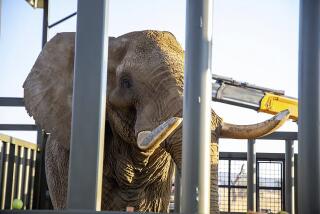Trainers Cleared in Elephant Beating
- Share via
SAN DIEGO — The San Diego city attorney said Thursday that no one at the San Diego Wild Animal Park will be prosecuted in the beating of Dunda the elephant because keepers were using an accepted training technique and because evidence about the incident is inconclusive.
Announcing the results of a six-week investigation by the San Diego Humane Society for his office, City Atty. John W. Witt said the “discipline” administered to Dunda by five elephant keepers at the park “involved chaining her four feet, hauling her down to her knees and repeatedly smacking her on the top of the head, where the skull is thick, with ax handles and the wooden end of elephant hooks”--baton-like instruments with metal hooks at one end.
“All our evidence indicates that discipline of Dunda, although seeming harsh to the uninitiated, is a technique accepted in the animal training profession,” Witt said. “Our evidence is, at best, inconclusive as to the severity of Dunda’s injuries and as to her temperament.”
A criminal case involving animal abuse charges would be riddled with reasonable doubt, making it improper to charge anyone with a crime stemming from the incident, Witt said. He added that the injuries inflicted on Dunda were not serious.
In a separate statement, Fred J. Lee, executive director of the Humane Society, said the disciplinary measures were “harsh,” but not prosecutable. Lee recommended that the Zoological Society develop new policies and procedures to ensure against abuse in the future.
The treatment of the elephant has drawn complaints from keepers at the San Diego Zoo, the Wild Animal Park’s sister institution, and from animal lovers around the state.
But Betty Jo Williams, president of the San Diego Zoological Society, said that Thursday’s announcement shows “our confidence in the professionalism of the Wild Animal Park’s elephant trainers is well-placed.”
“We are pleased that the professional standards of care we have worked so hard to bring to our elephant herd have been recognized.”
Alan Roocroft, supervisor in charge of elephants at the Wild Animal Park and one of those who participated in the discipline of Dunda, said Thursday that the incident had been blown out of proportion and that elephants have always received “a high standard of care.”
However, the decision drew immediate criticism from state Sen. Dan McCorquodale (D-San Jose), chairman of the Senate Natural Resources and Wildlife Committee, who said he was “disappointed that they didn’t take the responsibility to take the investigation a little more seriously than they did.”
McCorquodale said he will hold a public hearing on the issue in San Diego on July 29.
The elephant keepers at the San Diego Zoo, whose complaints brought the controversy to public attention, said Thursday they were angered by the results of the inquiry.
“If people are willing to accept this whole episode as being OK, then they need to see exactly what it is they are defending,” said Lisa Landres, an elephant keeper at the zoo. “If people could see the brutality involved, it would make them vomit. They would never tolerate it. No matter what this elephant did there is no justification for what was done to her.”
The controversy began last February when Dunda, an 18-year-old African elephant who lived most of her life at the San Diego Zoo, was transferred to the San Diego Wild Animal Park, on the northeastern edge of San Diego, near Escondido. The zoo and the park are operated by the Zoological Society of San Diego.
Keepers at the zoo contend that Dunda, always a nervous animal, was transferred without proper preparation, including giving her time before the move to adjust to her crate and meet her new keepers while still on familiar turf.
Once at the Wild Animal Park, Dunda was repeatedly beaten over several days by elephant keepers there, zoo workers said. Ragged pieces of hide are still visible on Dunda’s head.
Witt said Thursday that the Humane Society’s review of the incident showed that it was “far less serious than at first thought and arose from a legitimate need to discipline and train a dangerous, four-ton elephant.”
The chaining and beating technique is used by “reputable animal facilities around the country to establish dominance over the animal,” Witt said. That conclusion was based on interviews with two elephant keepers at the Los Angeles Zoo and a keeper at the Woodland Park Zoo in Seattle, according to Larry Boersma, a spokesman for the Humane Society. He declined to name the keepers.
McCorquodale said Thursday that based on his staff’s research, he disagrees with the Humane Society’s assessment. “We talked to a lot of zoos around the country and we find almost nobody willing to admit that they beat their elephants to discipline them,” he said. Witt acknowledged that the discipline administered to Dunda was “unpleasant for trainer and elephant alike” and said some keepers involved “reported feelings of nausea and sleeplessness as a result of their participation.”
More to Read
Sign up for Essential California
The most important California stories and recommendations in your inbox every morning.
You may occasionally receive promotional content from the Los Angeles Times.










